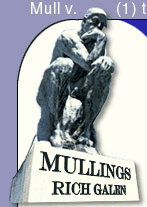
(Enter Term) Major US Papers
Los Angeles,Ca San Diego,Ca San Francisco,Ca Denver, Co Washington,DC Miami, Fl Atlanta,Ga Chicago,Il Baltimore,Md Boston,Ma Minneapolis,Mn St. Louis,Mo Kansas City,Mo New York,NY Charlotte,NC Cleveland,Oh Philadelphia,Pa Memphis,Tn Nashville,Tn Austin,Tx Dallas,Tx Houston,Tx
|

Click here: rich@mullings.com with the word "Subscribe" or "Remove" in the subject line.
Subscribe Today!Roll Call NewspaperMonday, February 4, 2002Frost Poll Yields Ominous ResultsBy Ethan Wallison
A much-guarded internal poll presented to House Democrats last week at their annual retreat paints a grim picture of the party's outlook in 22 districts that are considered key to Democratic prospects of winning the majority in November. Among the findings in the survey, a portion of which was obtained by Roll Call, are that Democrats face huge deficits among "persuadable" voters on a host of key issues, particularly the war on terrorism, and have seen their advantage disappear on a number of the party's bread-and-butter issues, such as improving education, and protecting Social Security. Perhaps more ominously for the Democrats are signs that Hispanics, who have long provided a key portion of the party's base vote, have more or less drifted into the persuadable category , with 45 percent of those polled saying there is a least a "fair chance" that he or she will vote for the Republican candidate for Congress. In spite of the results, Democrats appears to welcome the poll, which party strategists said was the first of its kind, as a candid snapshot of what the Democrats are up against this November. Or as one Democratic strategist succinctly put it, "We now know what not to do." The survey was sponsored for the most part by Caucus Chairman Martin Frost (Texas) and Vice Chairman Bob Menendez (NJ). Aides familiar with the survey said more than 1,000 voters were sampled across 22 marginal districts. "In some part it was a small revelation for other [in the Caucus]," said Rep. Baron Hill (Ind.), one of three Members in marginal districts who addressed the Caucus about the poll results at the retreat. Hill described the poll as an opportunity to "express how difficult it is for us to get elected in marginal districts because of the national message." The poll has become a rallying point for a sizable wing of the party, led by centrists, who argue that marginal Democrats are often hurt by their association with the party's national message insofar as it stresses traditional liberal themes such as gun control and abortion rights. Members and strategists suggested that the most significant outcome from the poll as that it showed the need for ideological "leeway" in the way the national party deals with its marginal Members. The survey revealed some of the inner tension that comes into play in staking out the Democratic message. House Minority Leader Richard Gephardt (Mo.) has long sought to create a "brand" for the party so that voters immediately associate it with a batch of poll-tested issues, such as HMO reform, and "saving" Medicare. But in nationalizing the message, the party constantly risks turbulence for its candidates in marginal districts that tend to be more culturally conservative and less open to traditional Democratic themes. "A national generic message, which was generated out of [the GOP's successful 'Contract with America'] - that doesn't work," Menendez said in an interview. He said the lesson for the party is that it needs a message that is broad enough "so that margial candidates aren't hindered by it." The poll's findings on the gun issue were particularly evocative. Asked to choose between the positions of generic GOP and Democratic candidates on the question of "restrictions on gun sales," 58 percent of the persuadable voters chose the Republican. Even within the party's base, the GOP's putative position on gun-sale restrictions fared reasonably well. Nearly a third of white base voters - and a quarter of the black base voters - preferred the GOP candidate. "More gun control is an issue I can't even touch in my district," Hill said. While Democrats appeared to lose a good bit of their advantage on a number of their traditionally strong issues, they appeared to find new thematic openings, particularly within their base. For instance that poll showed that among the party's white base voters, Democrats had a sizable advantage in categories such as "shares your values," "makes it easier for me to raise my children," and "makes me feel safe." A full section of the poll focused on how marginal candidates can "inoculate" themselves against possible blowback from the national party's positions. It showed a series of issues where the Republican advantage was so strong among persuadable voters that Democrats could best stay out of trouble by essentially taking up the GOP position. Strategists suggested one way marginal candidates are likely to be looking for inoculation in the months ahead is by aligning themselves with President Bush, whose poll numbers are strong even among Democratic base voters. Among the Democrats' white base voters, 66 percent said they have a favorable view of Bush. Former President Bill Clinton fared only marginally better, at 76 percent. The shift toward the GOP in the Hispanic community appears to be connected with Bush's popularity. The poll showed that 82 percent of Hispanics at least "somewhat approve" of President Bush's job performance, while the same number say they have at least a "somewhat favorable" impression of him. More than 50 percent of Hispanics who said they liked Bush's job performance or viewed him favorable say they feld "strongly" in that view. "[The poll] shows what a number of been saying for years - that you can't simply take Hispanics for granted," Frost said in an interview. "You've got to work for the Hispanic vote."
|

|
Major Int'l Papers
London, England Paris, France Buenos Aires, Argentina Sydney, Australia Sydney, Australia Manama, Bahrain Hamilton, Bermuda Toronto, Canada Hong Kong, China Beijing, China Prague, Czech Rep. London, England
Hamburg, Germany Agana, Guam Bombay, India New Delhi, India Jakarta, Indonesia Jerusalem, Israel Tokyo, Japan Christchurch, New Zeal'd Manila, Philippines Moscow, Russia Glasgow, Scotland Singapore, Singapore J'burg, S. Africa Taipei, Taiwan Bangkok, Thailand Ankara, Turkey |





